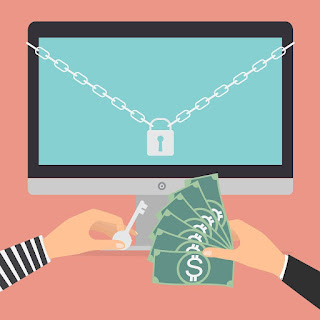Avoid being victim to Cyber Extortion!
Cyber extortion is an online crime, where hackers hold your data, website, computer systems and other sensitive information hostage until you pay them huge amounts of money. Unfortunately, these scams are becoming quite common, so we want to remind you to stay vigilant and be wary of anyone you are video chatting or speaking to online. We have put together some ways to protect yourself from Cyber extortion, as well as some contact information for you to report a scam.
Staying safe online
It is really important that you stay safe online, as there are lots of criminals who will take advantage of you on the web. Here are a few ways you can keep safe:1. Keep passwords secure – never share your passwords with anyone and make sure that they are strong. Make sure you never leave your laptop/phone unlocked in public areas too.
2. Privacy settings – Make sure all your profiles online are private. This way you can be the one to decide who sees what. If your profiles are public, this means anyone can access your personal information.
3. Personal details – If your profiles are public, make sure you do not post personal information on them such as your address or mobile number. You may think that having your mobile number online isn’t a big deal, but some hackers can find out a lot about you with just one piece of information.
4. Social media – Be mindful of what you post and who you speak to online. Be sure to never share personal information online. Some people may be pretending to be someone else so be cautious when getting to know people online.

Sextortion:
One of the more recent and most common ways people have been extorted online is through sextortion.Many people use webcams for flirting and to meet new people but sometimes the people you meet online aren’t who they say they are. Many criminals befriend their victims online by using a fake identity. Recently, many victims are being persuaded to perform sexual acts online via their webcam. These webcam videos are then recorded by the criminals and the victim threatened to send over money or the video will be released to their family, friends, university etc.
It is important to be careful when you become friends with people online, especially if you are sharing any personal details or anything intimate with them.
What to do if you’re a victim of sextortion?
1. Don’t panic.
Remain calm and contact your local police and internet service provider immediately. No one will judge you and it’s important that the situation is dealt with quickly so that the police have a chance of catching the criminals responsible.
2. Don't continue to communicate with the criminals.
Stop talking to the criminals immediately. Take screens shots of all your communication and suspend your account (don’t delete it) and use the online reporting process to report the matter to Skype, YouTube etc. to have any video content blocked and to set up an alert in case the video resurfaces. Make sure you only deactivate your account rather than shut it down so that the data is preserved, and this will help the police to find the criminals.3. Don't pay.
Remember, these people are criminals so they will usually keep asking for higher amounts of money. On some occasions even when the victim does pay, the offenders ask for more money, or release the footage anyway. If you have already paid, check to see if the money has been collected. If it has, and if you are able, make a note of where it was collected from. If it hasn't, then you should attempt to cancel the payment as soon as possible.4. Keep all evidence.
Make sure you keep all evidence of the extortion. For example, take screenshots, keep their social media ID and name (these are very important). For example, to get the Skype ID, right click on their profile, select ‘View Profile’ and then look for the name shown in blue rather than the one above it in black. It'll be next to the word ’Skype’ and will have no spaces in it. You should also save the Facebook URL, the Western Union or MoneyGram Money Transfer Control Number (MTCN)and any photos/videos that were sent, etc. The more evidence you have the more chance the police will have in catching the criminals.Help and support
If you have been victim of extortion or another kind of scam online, remember that you are not alone and there is lots of support to help you.The first thing you need to do is report the incident to the police, which you can do by clicking here.
If you feel that you need to talk to someone about your incident, other than the police, there is lots of support available which we have listed below:
- PAPYRUS provides confidential advice and support to young people
- Samaritans to talk any time you like in your own way and off the record
- Get Safe Online for tips on how to protect yourself online
- Revenge Porn Helpline if you have had intimate images shared online
- Skype advice on protecting yourself from blackmail
- Thinkuknow for advice about staying safe on a laptop/phone/tablet.
If you are in need of support and wish to talk to someone at the university, there is lots of support available to you which you can access by emailing deanofstudents@herts.ac.uk. Remember, you are not alone!

